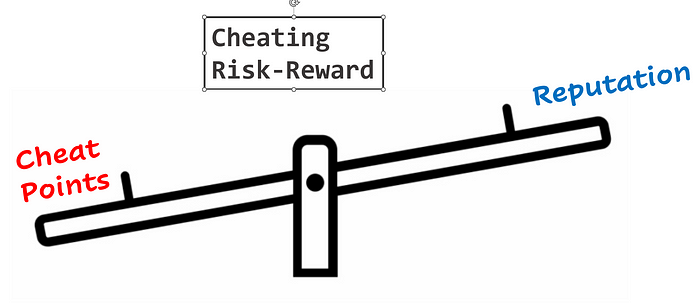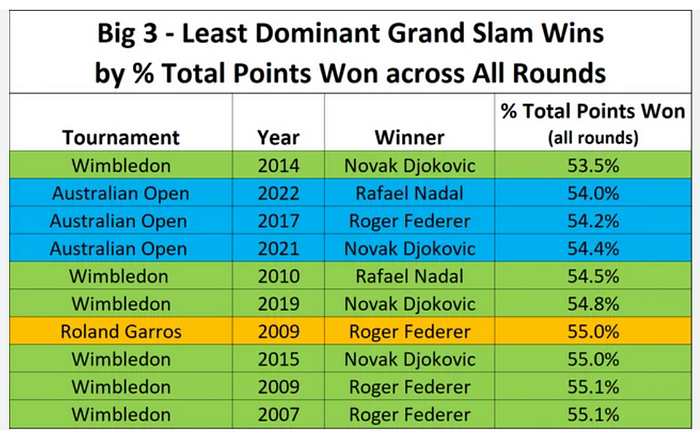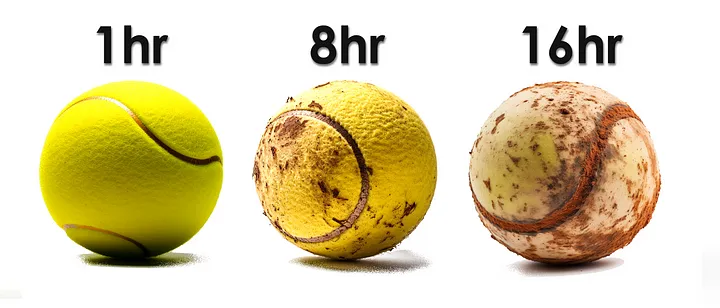Before tennis, I played football for 15 years and never recall a problem with cheating influencing a game. Sure plenty of teams tried to play too aggressively but with so many eyes on the ball they usually didn’t get away with it and this behavior usually invited immediate retaliation on the pitch!
I was really surprised therefore when I switched to tennis, and come across a steady series of players who try to win by cheating. Usually by bad line calls but sometimes ridiculous calls of let and sometimes by asking you not to hit the ball in their direction!
Background
Tennis is a game you play 1-on-1 almost always without an umpire. By convention you call the opposition’s shots in or out and visa versa. But this means fair play comes into the equation. However both players can see where the ball bounces and in cases of doubt, you could just ask the other person right? Wrong! From my experience about 1-in-50 friendly matches and 1-in-5 competitive matches are contaminated with bad calls!
OK, wait, I know this doesn’t mean there is cheating going on, I regularly play with one player who makes bad line calls accidentally. In that situation I overrule it if it was in. We let the opposition either have the point or if they prefer replay it (they usually opt for replay).
BUT I am not talking here about accidental bad calls. How do you tell if bad line calls are an innocent mistake or malevolent cheating?
Seven Signs The Opponent is Cheating on Calls
The first sign is the cheater is always grumpy as if playing you is a problem
They never say “I am not sure, what do you think?”
They generally call suspiciously bad calls on important points
They are way too certain about the hardest to see calls, that are closest the the lines
They argue about your calls…suddenly they make you doubt your own reliability
They rarely call balls that are just out as “in” (ie its not just bad eyesight!)
If you speak up politely, they respond aggressively or argumentatively
What these points show is that the person has a negative bias, and that negative call bias only comes in when it is important to them to use it. They also are not playing collaboratively by asking for, or even respecting your opinion….they are in it for themselves.
They make you doubt your judgement by shouting at your calls, because to them its battle of fake calls; not a battle of tennis balls!
What is “Out” in tennis
It’s really simple, if any part of the ball touches any part of the line it is “IN”. If there is daylight between ball and line it is “OUT”. Below is a pic of ball on the inside of the line…..this is exactly the kind of ball these people call “OUT”.
Here is another example the ball lands inside the service box here. This is exactly the kind of ball they called “OUT”. I actually think they convince themselves it is out; and once in a while they don’t know the rules of tennis.

Notice they didn’t even wait for the shot that only just hits the outside of the line (btw those would be in too)…… no these “on the inside of the line shots” were enough for them to call out!
Why Do They Cheat?
The simple reason people cheat is that they get more benefit from cheating with bad calls (higher chances of winning) than punishment (reputation damage with the opponent). Basically they want to win, more than they care about what you think of them. I guess if they are never going to meet you again, then they have little reason to care about your opinion (except surely they will expect you to trash them behind the scenes?). But what of the reward?

This table (below) shows tennis is a game of fine margins, often the winner can win by one point in a 100, and usually it is within 5 points in a 100.
Often the core game is balanced 50:50 decided in a few key points. If you opponent cheats 3 or 4 or 5 points, that is a massive advantage if it is done on those key points.

But Consider Why Are You Playing?
Given there is no umpire (ie referee) and you believe you should win, the temptation to cheat “just a bit” is too strong. However, cheats are really cheating themselves; sounds cliche, let me explain.
To understand why bad calls are a problem, you have to look at the bigger picture. 99% chance you are playing at a low level, in fact 100% chance because otherwise you would have an umpire. At the lower level most games have nothing or almost nothing at stake. Maybe a notional position on a made up ladder, maybe sometimes a fake trophy. The truth is, you shouldn’t be playing for that win, except as a practice for a better win.
What I am saying is you should be playing to improve yourself and ultimately reach a bigger goal. Sure it is annoying to lose, but believe me, there is always someone better, strong, fitter. By playing them, you very likely lose AND improve.
If you win by calling out line calls. You are making the court smaller but only for you. So you are playing a kind of kids game where only you know the court size, and declaring yourself the winner. Congratulations!
In practice I do the exact opposite, if I am playing a beginner, even as singles I dont mind playing the doubles court whilst they play on the singles courts their side (*provided it does not offend them).
How Should You Handle Cheaters
First, don’t be too quick to accuse anyone on the court, because whilst on the court they are effectively in charge of your points. Also anyone can make an honest mistake.
An honest person if asked “are you sure that was OUT?” will reply “Yes, I thought so, but what did you think, maybe I got it wrong”. They are acknowledging that no one is perfect. I have been playing for a year, most days and I have been rightfully challenged three times that I made an error….and I conceded I did make an error. It happens.
Play as fair as possible, but make a loud point of saying good shot, or close call but in; basically showing you are a fair player. Do not start cheating yourself just because they are. Honestly you wont feel good about it.
When they call your in shot “out”, just say “wow that looked in to me” in a surprised way. If your team mate is there: ask them what did they think. If it happens again, ask your team mate and their team mate (but their team mate will be in a difficult position).
Finally, if they continue with bad calls, alter your style to hit the ball well in and finish the match honorably. After the match, discuss that player with others and either ask to video the next match or if necessary decline to play that player in the future; their reputation is trashed. If you ask around, everyone probably already shares this opinion.



